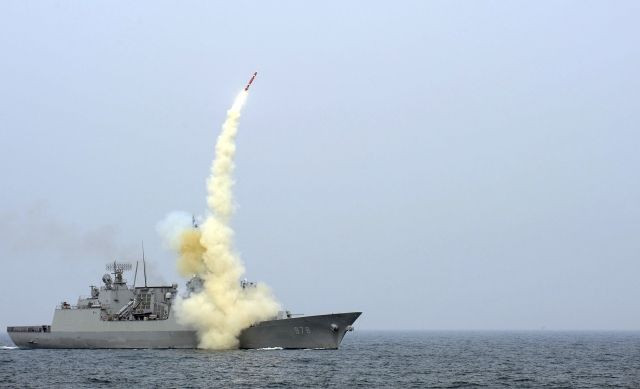South Korea Unveils Cruise Missile Capable Of Striking ‘Anywhere’ In North Korea

South Korea unveiled a cruise missile Thursday that has the ability to strike “anywhere” in the Korea peninsula and can hit “precise targets, such as windows of a North Korean command office.”
In response to Pyongyang’s nuclear test Tuesday, South Korea’s military Thursday carried out defense drills displaying combat readiness, in addition to stepping up surveillance and setting up facilities to collect air samples from the test site to determine the fission materials of the atomic blast, Seoul’s Yonhap news agency reported. The Navy deployed two fleets of about 10 warships each, including Aegis destroyers, submarines, patrol ships and high-speed boats, to the east and west of the Korean Peninsula, the report said.
South Korea’s Defense Ministry released a footage of the missile being launched from a destroyer and a submarine and hitting mock targets on land.
"The cruise missile being unveiled today is a precision-guided weapon that can identify and strike the window of the office of North Korea's leadership," ministry spokesman Kim Min-seok was quoted as saying by Reuters.
Though the missile was previewed in April, officials said its deployment was completed now.
On Feb. 4, South Korea and the U.S. launched a joint three-day naval drill involving a U.S. nuclear submarine in the waters off the coast of the divided peninsula.
Two U.S. ships equipped with long-range cruise missiles — the USS San Francisco, a 6,800-ton nuclear submarine and the 9,800-ton Aegis cruiser Shiloh — were mobilized for the exercise that was held off the southeastern port of Pohang.
South Korea’s President-elect Park Geun-hye had strongly condemned the test, saying that it posed a “grave threat to the Korean Peninsula and international peace, hampers inter-Korean trust-building and undermines efforts for peace.”
After the U.N. Security Council condemned Pyongyang’s third nuclear test in a unanimously approved statement Tuesday, South Korean Foreign Minister Kim Sung-hwan said that the council would consider “appropriate measures” to thwart North Korea’s plans to develop weapons of mass destruction.
Meanwhile, a commentary published Thursday by North Korea’s state-run KCNA reiterated its stance that Washington’s “hostile policy” towards Pyongyang “is increasing the danger of a war on the Korean Peninsula day by day and putting global peace and security at peril.”
The two Koreas are still technically considered to be at war since the 1950-‘53 Korean War ended with an armistice pact, not a peace treaty.
© Copyright IBTimes 2024. All rights reserved.






















